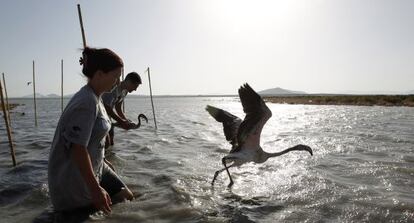Bird monitoring hit by cutbacks
Office of Migratory Species has fallen behind on international commitments

It has been 18 months since the Office of Migratory Species (OEM) closed its doors as a result of budget cuts. The closure means that in all this time nobody has been managing information about birds that live, breed or fly through Spain, or coordinating the bird ringing program, not to mention the bat and tortoise monitoring programs. The system is vital to international scientific activity, and its voluminous database of nearly seven million notes affords insight into the movements of birds, their exposure to climate change, causes of mortality, population evolution and dispersion - this latter phenomenon being essential at times of pandemics such as bird flu.
"The situation is very serious, because we are defaulting on our international commitments," says Jordi Figuerola, a researcher at the Doñana Biology Station and head of the animal ringing office, which attaches monitoring devices on 65,000 birds in a good year. "If a ring is recovered, whether from a bird that was ringed here or in another country, nobody can access the information about that specimen. We're turning into the laughing stock of Europe."
The Environment Ministry, which oversees the OEM, is considering a change in management, which until recently was awarded through public competitions. From now on (no date was specified), management will be turned over to "several agencies which are well respected by the scientific community, such as SEO/BirdLife," a ministry spokesperson said in a written reply. No other names were mentioned.
SEO/BirdLife provided technical assistance to OEM between 1983 and mid-2011, when the last public contract ended. "We managed to keep going in slow mode until mid-January 2012, but then we couldn't keep it up any longer," says Asunción Ruiz, executive director of the bird association. Ruiz asserts that talks with the ministry to unblock the situation are at an advanced stage and that there is "goodwill" to reach an agreement for running the OEM. The question still up in the air is financing. "We are a non-profit and in order to take charge of the OEM we need resources."
But Figuerola, of the Doñana station, notes there are several agencies involved in the bird ringing, yet "everything is being done behind our backs." There are around 1,000 bird ringing specialists in Spain, of whom around 70 percent work for SEO/BirdLife.
Meanwhile, the ministry website continues to offer a form to fill out for anyone who finds a ringed bird. "But we don't really know what happens to those emails; we don't know whether someone is updating the information or if the server has collapsed and notes have been lost," warns Raúl Aymí, head of the ringing department at the Catalan Ornithology Institute, which puts monitoring devices on around 80,000 birds a year.
Tu suscripción se está usando en otro dispositivo
¿Quieres añadir otro usuario a tu suscripción?
Si continúas leyendo en este dispositivo, no se podrá leer en el otro.
FlechaTu suscripción se está usando en otro dispositivo y solo puedes acceder a EL PAÍS desde un dispositivo a la vez.
Si quieres compartir tu cuenta, cambia tu suscripción a la modalidad Premium, así podrás añadir otro usuario. Cada uno accederá con su propia cuenta de email, lo que os permitirá personalizar vuestra experiencia en EL PAÍS.
¿Tienes una suscripción de empresa? Accede aquí para contratar más cuentas.
En el caso de no saber quién está usando tu cuenta, te recomendamos cambiar tu contraseña aquí.
Si decides continuar compartiendo tu cuenta, este mensaje se mostrará en tu dispositivo y en el de la otra persona que está usando tu cuenta de forma indefinida, afectando a tu experiencia de lectura. Puedes consultar aquí los términos y condiciones de la suscripción digital.









































